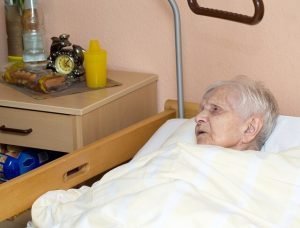
Free Consultation(203) 447-0000

Free Consultation(203) 447-0000
 Bedsores are a painful and preventable condition suffered by patients in nursing homes, hospitals, and while receiving home health care. Also known as pressure ulcers, pressure sores, or decubitus ulcers, they can develop quickly if not properly monitored, leading to debilitating and potentially fatal complications. A recent report estimated 60,000 annual fatalities are related to pressure ulcer complications. Approximately 11 percent of nursing facility residents and up to 29 percent of hospital patients develop bedsores. Such high numbers often point to negligence or inadequate staffing, and severe cases may result in malpractice claims by patients and family members. With proper staffing and patient care, risk factors for developing bedsores can be assessed, observed, and prevented.
Bedsores are a painful and preventable condition suffered by patients in nursing homes, hospitals, and while receiving home health care. Also known as pressure ulcers, pressure sores, or decubitus ulcers, they can develop quickly if not properly monitored, leading to debilitating and potentially fatal complications. A recent report estimated 60,000 annual fatalities are related to pressure ulcer complications. Approximately 11 percent of nursing facility residents and up to 29 percent of hospital patients develop bedsores. Such high numbers often point to negligence or inadequate staffing, and severe cases may result in malpractice claims by patients and family members. With proper staffing and patient care, risk factors for developing bedsores can be assessed, observed, and prevented.
Bedsores are the result of consistent, unrelieved pressure on one particular part of the body. Bony prominences are most susceptible, such as elbows, hips, heels, shoulder, or coccyx (tailbone). When a nursing home resident is bedridden or wheelchair bound, movement is limited. This inhibits a healthy blood flow while causing constant compression on these sites. Eventually, the skin begins to breakdown.
This degeneration is medically categorized by four stages. The mildest presents with redness of the affected area that becomes warm to the touch. By the time the skin and surrounding tissues deteriorate, muscles, tendons, fascia, and bone may become exposed. Bacterial infections are likely by this stage.
In nursing facilities, many of the risk factors for pressure sores may also be potential indications of health care neglect. Immobility is, again, the most common cause. However other factors contribute to a body’s susceptibility to bedsores:
Though nursing facilities should promote environments of compassion and advocacy for the elderly, this is not always the case. Government studies report that a minimum of 30 percent of US elder care homes perform some degree of malpractice. In the same study, approximately 5,000 of the resident fatalities listed malnutrition, dehydration, or pressure ulcers as the primary cause of death. The US Department of Health and Human Services proposes a federal standard of a two hour daily minimum, per patient, for nurse’s aide care. However, 54 percent of nursing homes fall below this standard.
If you suspect a friend or loved one has developed bedsores as a result of negligence, the following steps may help your case:
Dealing with nursing care neglect of a loved can be emotionally overwhelming. Understanding your legal rights is vital. At Berkowitz and Hanna LLC, our experienced malpractice attorneys will fight to protect the rights of your loved one. Our compassionate, knowledgeable legal team will examine every detail of your case and determine the best way to move forward. If you or a loved one has been the victim of nursing home, hospital, or home health care neglect, contact Berkowitz and Hanna LLC for a free consultation.
Berkowitz Hanna
